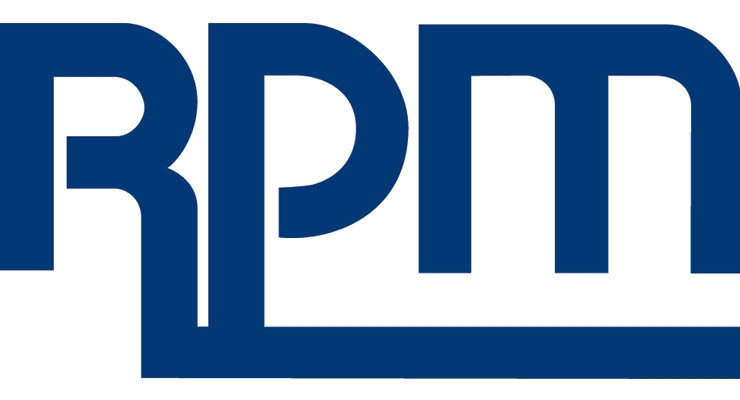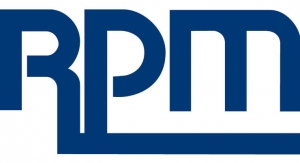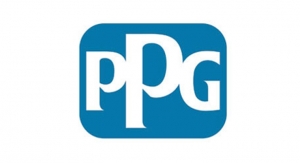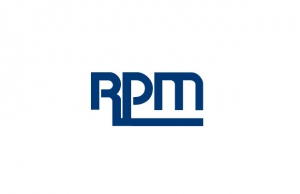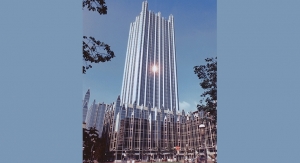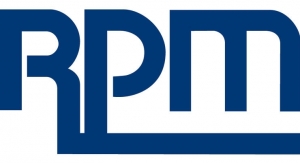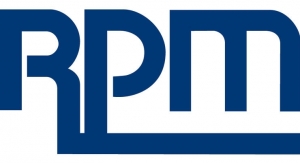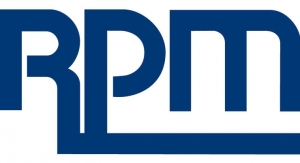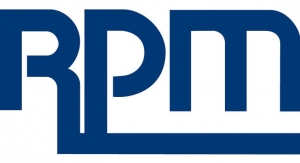01.04.18
RPM International Inc. reported record sales, net income and diluted earnings per share for its fiscal 2018 second quarter ended November 30, 2017. Sales increased 10.5% and net income of $95.5 million, or $0.70 per diluted share, compared to a year-ago net loss of $70.9 million, or loss of $0.54 per diluted share. The fiscal 2017 second-quarter results included a $188.3 million pre-tax ($129.2 million or $0.97 per diluted share, after-tax) impairment charge. The fiscal 2017 second-quarter results also included a charge of $12.3 million, or $0.09 per share, which had no tax impact, related to the decision to exit an industrial segment business in the Middle East.
Second-Quarter Results
Net sales of $1.32 billion were up 10.5% over the $1.19 billion reported a year ago. Organic sales improved 4.2% and acquisition growth added 4.7%. Foreign currency translation increased sales by 1.6%. Net income of $95.5 million compares to last year’s adjusted net income of $70.5 million. Earnings per diluted share of $0.70 in the current quarter, which included a $0.09 per diluted share tax benefit relative to last year’s tax rate, compare to an adjusted $0.52 per diluted share last year. Earnings per diluted share increased 34.6% from last year’s adjusted earnings per diluted share of $0.52, and increased 17.3% excluding the $0.09 per diluted share tax benefit. Income before income taxes (IBT) of $109.2 million compares to a loss before income taxes of $106.9 million reported in the fiscal 2017 second quarter. RPM's consolidated earnings before interest and taxes (EBIT) of $131.8 million compare to a consolidated loss before interest and taxes of $86.4 million reported in the fiscal 2017 second quarter. Excluding the year-ago charges, RPM’s consolidated EBIT for the fiscal 2018 second quarter improved 15.4% over $114.2 million in the fiscal 2017 second quarter. The EBIT improvement of 15.4% included the cost savings benefit in “Corporate/Other” expenses of $11.1 million from lower pension, healthcare, acquisition-related expenses and professional fees.
“We were very pleased with RPM’s results during the fiscal second quarter. Our strategically balanced business model performed as intended with strength in our industrial and specialty businesses offsetting weakness in our consumer segment. Sales growth was strong across all three of our business segments, with a balance of organic and acquisition growth. We are also seeing the benefits of last year’s product line acquisitions and cost reduction efforts on improved leverage, which more than offset higher raw material costs that have negatively impacted gross profit margins,” stated Frank C. Sullivan, chairman and chief executive officer.
Second-Quarter Segment Sales and Earnings
During the fiscal 2018 second quarter, industrial segment sales increased 11.0%, to $702.9 million from $633.4 million in the fiscal 2017 second quarter. Organic sales improved 5.4%, while acquisition growth added 3.3%. Foreign currency translation increased sales by 2.3%. IBT for the industrial segment increased 34.6%, to $67.7 million from $50.3 million in the fiscal 2017 second quarter. Industrial segment EBIT increased 34.5%, to $70.2 million from $52.2 million in the fiscal 2017 second quarter. Industrial segment EBIT was up 8.9% over an adjusted $64.5 million in the fiscal 2017 second quarter, excluding last year’s charge to exit a Middle Eastern flooring business.
“Our strong organic sales growth of 5.4% in the industrial segment was driven by North American roofing and those businesses providing polymer flooring to commercial and industrial markets. We also saw a slight rebound in our companies serving the oil and gas industry, which reported positive organic year-over-year sales growth for the first time in three years. We continue to see mixed results from our industrial businesses in Europe, while Latin American industrial operations, particularly in Brazil, continue to struggle. EBIT margins were negatively impacted by higher raw material costs and unfavorable transactional foreign currency exchange,” Sullivan stated.
RPM’s fiscal 2018 second-quarter consumer segment sales increased 11.1%, to $415.4 million from $373.8 million a year ago. Organic sales increased 3.0%, while acquisition growth added 7.3%. Foreign currency translation increased sales by 0.8%. The consumer segment had IBT of $45.1 million, compared to a loss before income taxes of $140.6 million in the fiscal 2017 second quarter. The segment reported EBIT of $45.2 million, compared to a loss before interest and taxes of $140.6 million reported last year. EBIT was off 5.3% from an adjusted $47.7 million in the fiscal 2017 second quarter, which excludes the impairment charge related to RPM’s consumer nail enamel business.
“During the quarter, we saw a sharp uptick in business from caulks and sealants products, as well as some international markets. The segment also benefited from last year’s acquisitions of Touch ‘N Foam in the U.S. and SPS in Europe. The decline in EBIT resulted from higher raw material costs and unfavorable manufacturing absorption and product mix,” stated Sullivan.
Second-quarter sales for the specialty segment increased 7.4%, to $197.1 million from $183.6 million in the fiscal 2017 second quarter. Organic growth was 2.8%, while acquisitions added 3.8%. Foreign currency translation increased sales by 0.8%. IBT for the specialty segment increased 10.5%, to $34.4 million from $31.2 million in the fiscal 2017 second quarter. Specialty segment EBIT improved 10.8%, to $34.4 million from $31.0 million a year ago.
“We experienced strong growth in many of our specialty segment product lines, particularly U.S.-based restoration service businesses, with higher than normal sales volumes into the hurricane impacted regions prior to and after the storms, as well as powder coatings and wood finishes, after overcoming lost sales from last year’s closure of an unprofitable European business and recent patent expiration. We were able to mitigate the negative impact of the patent expiration by retaining most of our larger customers,” Sullivan stated.
Cash Flow and Financial Position
For the first half of fiscal 2018, cash from operations was $115.2 million, compared to $158.7 million a year ago. Capital expenditures of $45.3 million compared to $48.0 million during the first half of last year. Total debt at November 30, 2017 was $2.14 billion, compared to $1.64 billion at November 30, 2016 and $2.1 billion at May 31, 2017. RPM’s net (of cash) debt-to-total capitalization ratio was 53.8%, compared to 52.8% at November 30, 2016. At November 30, 2017, liquidity stood at $971.7 million, including cash of $267.9 million and $703.8 million in long-term committed available credit.
First-Half Sales and Earnings
Fiscal 2018 first-half net sales improved 8.9%, to $2.66 billion from $2.44 billion during the first six months of fiscal 2017. Organic growth was 2.5%, acquisitions added 5.5% and positive foreign currency translation added 0.9%. Net income improved 406.4%, to $211.9 million from $41.8 million in the fiscal 2017 first half. Diluted earnings per share were $1.56, up 387.5% from $0.32 a year ago. IBT of $264.5 million was up 535.5% over the $41.6 million reported in the fiscal 2017 first half. EBIT of $309.4 million was 281.8% above the $81.0 million reported last year. Excluding the impairment and Middle East business exit charge in fiscal 2017, fiscal 2018 first half EBIT was up 9.9% over an adjusted $281.6 million last year.
First-Half Segment Sales and Earnings
RPM’s industrial segment fiscal 2018 first-half sales were up 9.4%, to $1.43 billion from $1.31 billion in the fiscal 2017 first half. Organic sales increased 3.8%, while acquisition growth added 4.2%. Foreign currency translation increased sales by 1.4%. IBT for the industrial segment increased 12.2%, to $156.6 million from $139.6 million in fiscal 2017. EBIT of $161.7 million was up 12.8% from $143.3 million in the first half last year. Excluding the Middle East business exit charge last year, industrial segment EBIT increased 3.9%, from $155.6 million a year ago.
First-half sales for the consumer segment improved 8.9%, to $842.6 million from $773.7 million a year ago. Organic sales were flat, but acquisition growth added 8.5% and foreign currency translation increased sales by 0.4%. The consumer segment reported IBT of $117.5 million, compared to a loss before interest and taxes of $70.5 million in the year-ago first half. EBIT of $117.8 million compares to a loss before interest and taxes in the fiscal 2017 second quarter of $70.5 million. Consumer segment EBIT was essentially flat to an adjusted EBIT of $117.8 million last year, excluding the impairment charge.
Specialty segment sales grew 7.1%, to $385.6 million from $359.9 million in the 2017 first half. Organic growth was 2.9%, while acquisitions added 3.9%. Foreign currency translation increased sales by 0.3%. IBT for the specialty segment increased 9.6%, to $67.6 million from $61.7 million in fiscal 2017. For the first half of fiscal 2018, specialty segment EBIT increased 9.8%, to $67.4 million from $61.4 million a year ago.
Business Outlook
“In our industrial segment, we expect steady results during the second half of the fiscal year from our North American commercial construction-related businesses, aided by higher sales in regions impacted by hurricanes, as well as continued positive results from our businesses serving the oil and gas markets. Our business in Brazil, seems to have bottomed out and should be neutral in the back half. Overall, the global economy is improving and currency translation is favorable. Additionally, we are driving improved operating leverage throughout the entire industrial segment by continually pursuing additional cost savings and efficiencies. With this global backdrop, industrial segment sales growth for the balance of the fiscal year should be in the upper-single-digit range,” stated Sullivan.
“In the consumer segment, we expect sales growth in the low-to-mid-single-digit range during the back half of the fiscal year. Most of the growth will be organic, as last year’s acquisitions annualize their purchase date during the third quarter. We plan to invest in our great brands by stepping up advertising and promotional activity in the spring sell-in season and therefore, expect back-half earnings results to be fairly flat to last year in this segment,” he stated.
“In the specialty segment, we expect sales growth in the low-single-digit range during the back half of the fiscal year. This, too, will be mostly organic as last year’s acquisitions also annualize their purchase date during the third quarter. We will continue to face headwinds from the patent expiration through the first quarter of fiscal 2019,” he stated.
“In aggregate, our operations have performed in line with our expectations when we issued our fiscal 2018 guidance back in July, and we would expect this trend to generally continue in the back half of this fiscal year. In regard to our taxes, our 19.6% effective tax rate for the first six months has been better than expected. We approved and completed certain foreign legal entity restructurings that resulted in the recognition of favorable discrete tax benefits that reduces our annual effective tax rate from the rate utilized for our current EPS guidance,” Sullivan stated.
“With the enactment of new federal tax legislation two weeks ago, there is a corporate rate reduction from 35% to 21%. The corporate rate reduction is effective for us as of January 1, 2018 and accordingly will reduce our current fiscal year federal statutory rate to a blended rate of approximately 29.2%. This is expected to further reduce RPM’s effective tax rate this year by two to three percentage points, adding approximately $0.10 per diluted share to our fiscal 2018 outlook. Additionally, in the third quarter we expect to record a discrete tax adjustment for the impact of the rate change on our deferred tax assets and liabilities, as well as the impact of the transition tax on deferred foreign earnings,” stated Sullivan. “Excluding this one-time discrete tax adjustment resulting from the new federal tax legislation, we are increasing our full-year fiscal 2018 EPS guidance to a range of $3.00 to $3.10 per share.”
Second-Quarter Results
Net sales of $1.32 billion were up 10.5% over the $1.19 billion reported a year ago. Organic sales improved 4.2% and acquisition growth added 4.7%. Foreign currency translation increased sales by 1.6%. Net income of $95.5 million compares to last year’s adjusted net income of $70.5 million. Earnings per diluted share of $0.70 in the current quarter, which included a $0.09 per diluted share tax benefit relative to last year’s tax rate, compare to an adjusted $0.52 per diluted share last year. Earnings per diluted share increased 34.6% from last year’s adjusted earnings per diluted share of $0.52, and increased 17.3% excluding the $0.09 per diluted share tax benefit. Income before income taxes (IBT) of $109.2 million compares to a loss before income taxes of $106.9 million reported in the fiscal 2017 second quarter. RPM's consolidated earnings before interest and taxes (EBIT) of $131.8 million compare to a consolidated loss before interest and taxes of $86.4 million reported in the fiscal 2017 second quarter. Excluding the year-ago charges, RPM’s consolidated EBIT for the fiscal 2018 second quarter improved 15.4% over $114.2 million in the fiscal 2017 second quarter. The EBIT improvement of 15.4% included the cost savings benefit in “Corporate/Other” expenses of $11.1 million from lower pension, healthcare, acquisition-related expenses and professional fees.
“We were very pleased with RPM’s results during the fiscal second quarter. Our strategically balanced business model performed as intended with strength in our industrial and specialty businesses offsetting weakness in our consumer segment. Sales growth was strong across all three of our business segments, with a balance of organic and acquisition growth. We are also seeing the benefits of last year’s product line acquisitions and cost reduction efforts on improved leverage, which more than offset higher raw material costs that have negatively impacted gross profit margins,” stated Frank C. Sullivan, chairman and chief executive officer.
Second-Quarter Segment Sales and Earnings
During the fiscal 2018 second quarter, industrial segment sales increased 11.0%, to $702.9 million from $633.4 million in the fiscal 2017 second quarter. Organic sales improved 5.4%, while acquisition growth added 3.3%. Foreign currency translation increased sales by 2.3%. IBT for the industrial segment increased 34.6%, to $67.7 million from $50.3 million in the fiscal 2017 second quarter. Industrial segment EBIT increased 34.5%, to $70.2 million from $52.2 million in the fiscal 2017 second quarter. Industrial segment EBIT was up 8.9% over an adjusted $64.5 million in the fiscal 2017 second quarter, excluding last year’s charge to exit a Middle Eastern flooring business.
“Our strong organic sales growth of 5.4% in the industrial segment was driven by North American roofing and those businesses providing polymer flooring to commercial and industrial markets. We also saw a slight rebound in our companies serving the oil and gas industry, which reported positive organic year-over-year sales growth for the first time in three years. We continue to see mixed results from our industrial businesses in Europe, while Latin American industrial operations, particularly in Brazil, continue to struggle. EBIT margins were negatively impacted by higher raw material costs and unfavorable transactional foreign currency exchange,” Sullivan stated.
RPM’s fiscal 2018 second-quarter consumer segment sales increased 11.1%, to $415.4 million from $373.8 million a year ago. Organic sales increased 3.0%, while acquisition growth added 7.3%. Foreign currency translation increased sales by 0.8%. The consumer segment had IBT of $45.1 million, compared to a loss before income taxes of $140.6 million in the fiscal 2017 second quarter. The segment reported EBIT of $45.2 million, compared to a loss before interest and taxes of $140.6 million reported last year. EBIT was off 5.3% from an adjusted $47.7 million in the fiscal 2017 second quarter, which excludes the impairment charge related to RPM’s consumer nail enamel business.
“During the quarter, we saw a sharp uptick in business from caulks and sealants products, as well as some international markets. The segment also benefited from last year’s acquisitions of Touch ‘N Foam in the U.S. and SPS in Europe. The decline in EBIT resulted from higher raw material costs and unfavorable manufacturing absorption and product mix,” stated Sullivan.
Second-quarter sales for the specialty segment increased 7.4%, to $197.1 million from $183.6 million in the fiscal 2017 second quarter. Organic growth was 2.8%, while acquisitions added 3.8%. Foreign currency translation increased sales by 0.8%. IBT for the specialty segment increased 10.5%, to $34.4 million from $31.2 million in the fiscal 2017 second quarter. Specialty segment EBIT improved 10.8%, to $34.4 million from $31.0 million a year ago.
“We experienced strong growth in many of our specialty segment product lines, particularly U.S.-based restoration service businesses, with higher than normal sales volumes into the hurricane impacted regions prior to and after the storms, as well as powder coatings and wood finishes, after overcoming lost sales from last year’s closure of an unprofitable European business and recent patent expiration. We were able to mitigate the negative impact of the patent expiration by retaining most of our larger customers,” Sullivan stated.
Cash Flow and Financial Position
For the first half of fiscal 2018, cash from operations was $115.2 million, compared to $158.7 million a year ago. Capital expenditures of $45.3 million compared to $48.0 million during the first half of last year. Total debt at November 30, 2017 was $2.14 billion, compared to $1.64 billion at November 30, 2016 and $2.1 billion at May 31, 2017. RPM’s net (of cash) debt-to-total capitalization ratio was 53.8%, compared to 52.8% at November 30, 2016. At November 30, 2017, liquidity stood at $971.7 million, including cash of $267.9 million and $703.8 million in long-term committed available credit.
First-Half Sales and Earnings
Fiscal 2018 first-half net sales improved 8.9%, to $2.66 billion from $2.44 billion during the first six months of fiscal 2017. Organic growth was 2.5%, acquisitions added 5.5% and positive foreign currency translation added 0.9%. Net income improved 406.4%, to $211.9 million from $41.8 million in the fiscal 2017 first half. Diluted earnings per share were $1.56, up 387.5% from $0.32 a year ago. IBT of $264.5 million was up 535.5% over the $41.6 million reported in the fiscal 2017 first half. EBIT of $309.4 million was 281.8% above the $81.0 million reported last year. Excluding the impairment and Middle East business exit charge in fiscal 2017, fiscal 2018 first half EBIT was up 9.9% over an adjusted $281.6 million last year.
First-Half Segment Sales and Earnings
RPM’s industrial segment fiscal 2018 first-half sales were up 9.4%, to $1.43 billion from $1.31 billion in the fiscal 2017 first half. Organic sales increased 3.8%, while acquisition growth added 4.2%. Foreign currency translation increased sales by 1.4%. IBT for the industrial segment increased 12.2%, to $156.6 million from $139.6 million in fiscal 2017. EBIT of $161.7 million was up 12.8% from $143.3 million in the first half last year. Excluding the Middle East business exit charge last year, industrial segment EBIT increased 3.9%, from $155.6 million a year ago.
First-half sales for the consumer segment improved 8.9%, to $842.6 million from $773.7 million a year ago. Organic sales were flat, but acquisition growth added 8.5% and foreign currency translation increased sales by 0.4%. The consumer segment reported IBT of $117.5 million, compared to a loss before interest and taxes of $70.5 million in the year-ago first half. EBIT of $117.8 million compares to a loss before interest and taxes in the fiscal 2017 second quarter of $70.5 million. Consumer segment EBIT was essentially flat to an adjusted EBIT of $117.8 million last year, excluding the impairment charge.
Specialty segment sales grew 7.1%, to $385.6 million from $359.9 million in the 2017 first half. Organic growth was 2.9%, while acquisitions added 3.9%. Foreign currency translation increased sales by 0.3%. IBT for the specialty segment increased 9.6%, to $67.6 million from $61.7 million in fiscal 2017. For the first half of fiscal 2018, specialty segment EBIT increased 9.8%, to $67.4 million from $61.4 million a year ago.
Business Outlook
“In our industrial segment, we expect steady results during the second half of the fiscal year from our North American commercial construction-related businesses, aided by higher sales in regions impacted by hurricanes, as well as continued positive results from our businesses serving the oil and gas markets. Our business in Brazil, seems to have bottomed out and should be neutral in the back half. Overall, the global economy is improving and currency translation is favorable. Additionally, we are driving improved operating leverage throughout the entire industrial segment by continually pursuing additional cost savings and efficiencies. With this global backdrop, industrial segment sales growth for the balance of the fiscal year should be in the upper-single-digit range,” stated Sullivan.
“In the consumer segment, we expect sales growth in the low-to-mid-single-digit range during the back half of the fiscal year. Most of the growth will be organic, as last year’s acquisitions annualize their purchase date during the third quarter. We plan to invest in our great brands by stepping up advertising and promotional activity in the spring sell-in season and therefore, expect back-half earnings results to be fairly flat to last year in this segment,” he stated.
“In the specialty segment, we expect sales growth in the low-single-digit range during the back half of the fiscal year. This, too, will be mostly organic as last year’s acquisitions also annualize their purchase date during the third quarter. We will continue to face headwinds from the patent expiration through the first quarter of fiscal 2019,” he stated.
“In aggregate, our operations have performed in line with our expectations when we issued our fiscal 2018 guidance back in July, and we would expect this trend to generally continue in the back half of this fiscal year. In regard to our taxes, our 19.6% effective tax rate for the first six months has been better than expected. We approved and completed certain foreign legal entity restructurings that resulted in the recognition of favorable discrete tax benefits that reduces our annual effective tax rate from the rate utilized for our current EPS guidance,” Sullivan stated.
“With the enactment of new federal tax legislation two weeks ago, there is a corporate rate reduction from 35% to 21%. The corporate rate reduction is effective for us as of January 1, 2018 and accordingly will reduce our current fiscal year federal statutory rate to a blended rate of approximately 29.2%. This is expected to further reduce RPM’s effective tax rate this year by two to three percentage points, adding approximately $0.10 per diluted share to our fiscal 2018 outlook. Additionally, in the third quarter we expect to record a discrete tax adjustment for the impact of the rate change on our deferred tax assets and liabilities, as well as the impact of the transition tax on deferred foreign earnings,” stated Sullivan. “Excluding this one-time discrete tax adjustment resulting from the new federal tax legislation, we are increasing our full-year fiscal 2018 EPS guidance to a range of $3.00 to $3.10 per share.”

